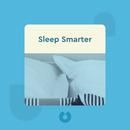Sleep Smarter
Sleep Smarter: 21 Essential Strategies to Sleep Your Way to A Better Body, Better Health, and Bigger Success
Your highlights:The importance of sleep is overlooked and underrated.
Thus, sleep is not the enemy of productivity or an obstacle to overcome. It is a necessary restorative state, vital for our physical and psychological well-being. We simply cannot be healthy or function at peak performance without good quality sleep.
16 August, 2019 10:41 Share
When it comes to sleep, light is our best friend and worst enemy.
This is why we should try to maximize light exposure during the day. And it’s particularly important to expose ourselves to sunlight early in the morning, because bright light also prompts our brains, organs and glands to wake up and be alert. With this in mind, try getting a short walk in somewhere between the hours of 6:00 a.m. and 8:30 a.m.
16 August, 2019 10:42 Share
At the other end of the day, in the evenings, limit your exposure to screens, starting 60 minutes before bed. Electronic devices pump out a heavy blue spectrum of artificial light. Your body is especially sensitive to this spectrum, and exposure to it in the evening inhibits the release of melatonin, making it harder to sleep. There is software available for phones and computers that filters this blue spectrum out, but it’s better to steer clear of the screens completely and read a book before bed instead.
16 August, 2019 10:43 Share
Studies have shown that light in bedrooms can suppress melatonin levels by over 50 percent, so blackout blinds are a must for those sleeping after sunrise!
16 August, 2019 10:43 Share
To snooze soundly, make the correct lifestyle choices.
Caffeine is a nervous system stimulant, one that on a molecular level is very similar to adenosine. Adenosine is a chemical that our brain produces while we’re awake, and once our adenosine levels hit a certain point, we start to get sleepy. Because of its similar nature, caffeine fits snugly into the very same receptors in our brain that adenosine is trying to enter, blocking its path. That’s why we don’t feel tired after drinking a coffee.
16 August, 2019 10:45 Share
Evening alcohol consumption is another thing we should curb. Although a few drinks might help us to fall asleep, it’s highly disruptive once we’re away, limiting the amount of time we spend in the deeper stages of sleep. In particular, alcohol interferes with REM sleep – the sleep stage responsible for memory processing. This means that alcohol-laced snoozes are terrible for memorizing facts and fortifying intelligence. Sorry, students!
16 August, 2019 10:46 Share
Maintaining a healthy mind and body is crucial for a great sleep.
Supplementing with magnesium is another great way to stay healthy and supercharge your snooze.
16 August, 2019 10:48 Share
It’s estimated that more than 50,000 thoughts run through our minds each day. And although most of them are short-lived, our inner monologue often intensifies when we’re trying to drift off to sleep. But meditation can change this. The simple act of closing our eyes and focusing on our breathing, even just for 10 minutes, is proven to lower stress and release feel-good endorphins into our system, priming us to drift off. In short, meditation is like a tonic for our manic, hyperactive minds. And what better place to start meditating than in your new sleep sanctuary?
16 August, 2019 10:49 Share
Creating a sleep sanctuary gives us the best possible environment to rest in.
Bringing phone calls, texts and emails into our sleeping space is one of the worst things we can do. That’s because it creates a spike in our cortisol levels – a hormone closely associated with stress and wakefulness. It also leads our brains to create a negative association with our bedroom, which subconsciously makes it more difficult to sleep there. We need to be strict with ourselves and not allow work to enter our sleep sanctuary; this is a place for us to switch off and zone out.
16 August, 2019 10:50 Share
About the book:
Sleep Smarter (2014) is your quickstart manual for improving the quality of your sleep. Drawing from a host of scientific studies and punctuated with practical tips, this accessible guide promises to change the way you think about sleep and give you a better night’s rest, starting tonight.
About the author:
Shawn Stevenson studied business, biology and kinesiology at the University of Missouri–St. Louis, before founding Advanced Integrative Health Alliance – a company providing wellness services for individuals and organizations worldwide. He is also a keynote speaker and podcaster, having spoken at TEDx and created The Model Health Show podcast.
Blinkist takes outstanding nonfiction books and distills their key insights into made-for-mobile book summaries that you can read in just 15 minutes. Learn something new every day - on your smartphone, tablet or PC.
blinkist.com